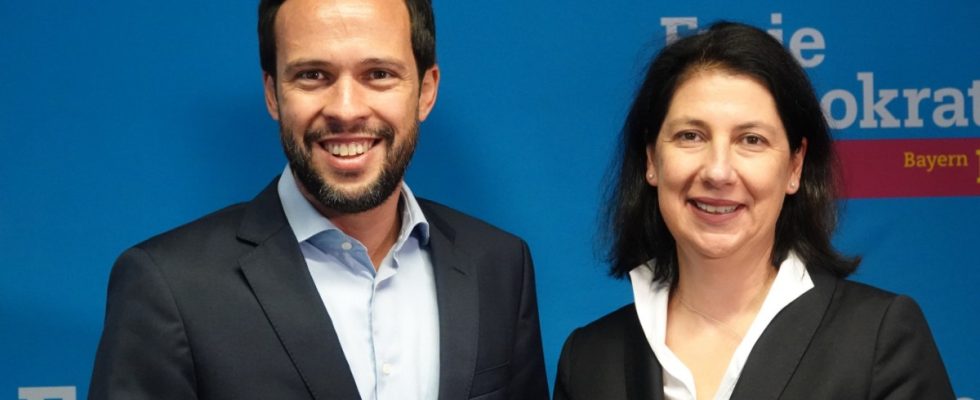The Bavarian FDP, which is no longer a member of the new state parliament after its election defeat, is reorganizing its personnel. The previous state and parliamentary group leader Martin Hagen wants to lead the party in the Free State with dual leadership in the future – with financial politician Katja Hessel. She is Parliamentary State Secretary in Christian Lindner’s Federal Ministry of Finance; In the CSU-FDP coalition in Bavaria from 2008 to 2013, she served as State Secretary for Economic Affairs in the cabinet of then Prime Minister Horst Seehofer. Martin Hagen, 42, and Katja Hessel 51, presented their candidacies on Monday in Munich. At the weekend they want to stand for election as a leadership duo at a state party conference in Amberg.
The previous Bavarian Secretary General Lukas Köhler, like Hessel a member of the Bundestag, is to become one of their deputy state heads. Köhler’s place in the party office should be taken by Christoph Skutella from Weiden, most recently a member of the state parliament faction that is now being liquidated with a focus on environmental policy.
It is unmistakable that after the defeat in the state elections with only three percent, the Bavarian FDP is putting more emphasis on what it still has to show – influence in Berlin. We are “facing a new situation,” explained Hagen: Apo in Bavaria, i.e. extra-parliamentary opposition, but still a government partner in the federal government. This led to the idea of a “broader positioning”. With Hessel they also want to “make the core competence of financial policy visible”. The designated co-state leader added that she could contribute her experience as a member of the state and federal government. It’s about the 2025 federal election; in the 2021 election, the Liberals in the Free State won an impressive 10.5 percent of the second votes. In addition, we have to “set the course” now for the state elections in five years.
The FDP sees many aspects covered by the planned new leadership tableau of two chairmen, vice-chairs and general secretary – women and men as well as a regional distribution: Hagen and Köhler, for example, come from Munich and the surrounding area, Katja Hessel from Nuremberg, Skutella from the Upper Palatinate. The mix of professional politicians and “volunteers” – as will be the case again with Hagen, who was an independent communications consultant before the mandate – is also well covered.
Bavaria is the first FDP state association with dual leadership
The Bavarian FDP only anchored the possibility of dual leadership in its statutes last year; Incidentally, for all party divisions and as the first regional association of the Free Democrats. State parliament member Julika Sandt, who had introduced the amendment to the statutes, argued at the time: “Dual leadership opens up new opportunities for us to bring diversity into our leadership structures. A McKinsey study has impressively shown that mixed teams are more successful.” The model could also be “a great relief for people who have professional and family responsibilities to spread volunteer work across more shoulders.” It was unclear at the time whether and when this resolution could be brought to life. The decision was made to do so, said Hagen, right after the election was lost. Probably also because the volunteering factor actually came into play.
When the idea of a dual leadership was circulating in political Munich in the past few days, the name Susanne Seehofer was immediately mentioned. The daughter of the former CSU Prime Minister only joined the FDP in 2021, became a well-known face of the party in the recent election campaign and won 7.3 percent of the first votes in the Munich-Mitte constituency. Unfortunately, for professional reasons, she is not available for a leadership position on the state board, said Hagen when asked. He had already said in an interview with the Evening News said: Susanne Seehofer ran a “fantastic election campaign” and he would like “her to play an even bigger role in the party in the future.” She is deputy leader of the Munich FDP.
In the interview, Hagen also outlined how he wanted to keep the Bavarian FDP in the conversation as Apo. “We have experience with this situation,” he said. Unlike between 2013 and 2017, there is now no phase in which one is neither in the state parliament nor in the Bundestag. “Fortunately, things are different now; we are perceived as a federal political force.” And we will “use and maintain” the know-how, contacts and awareness of the past five years of state parliament in such a way that we don’t have to start from scratch again in the state elections in 2028.

